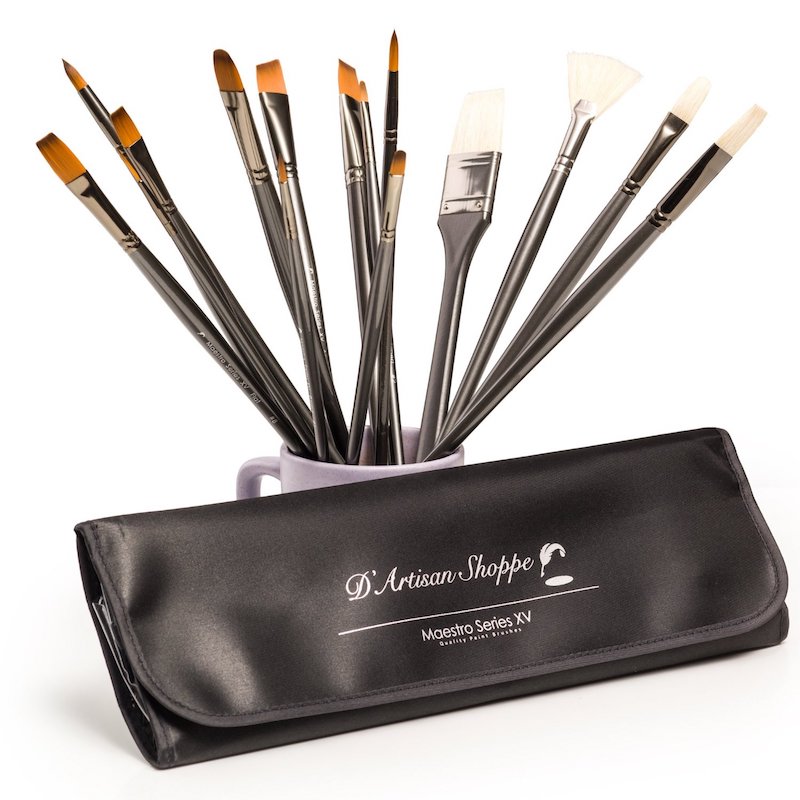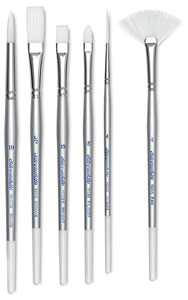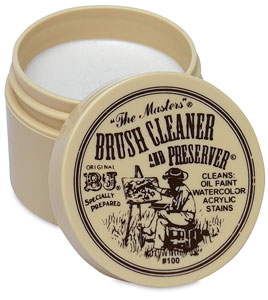Can you use the same set of brushes for watercolors and acrylics?
Reader Question: Are brushes damaged by an alternation between acrylic and watercolor usage? Should I use only one set for one and one set for the other? Also, is there any difference between acrylic and watercolor brushes in terms of clean-up for brush longevity?
In general, I would suggest using one set of brushes for watercolors and a separate set for acrylics, because watercolors and acrylics have different chemical compositions that interact differently with the brushes (the same can be said for the mediums used with each type of paint).
Plus, watercolor brushes and acrylic brushes differ in construction. Acrylic brushes are designed to cater to the viscosity and drying time of acrylics (as well as the rougher handling of the brush) while watercolor brushes are optimized to work well with the fluidity and delicacy of watercolor paints and techniques.
Technically, you can safely use watercolors with acrylic brushes, but always exercise caution when using watercolor brushes with acrylics. A single use with acrylics can irreparably alter a watercolor brush.
If your watercolor brush is made from synthetic hairs, then you can use them with acrylics - but if your watercolor brush is made from natural hairs, then you shouldn't use them with acrylics. Here's why:
Acrylic paint is harsher on a paintbrush than watercolors, so they shouldn't be used on natural hair paint brushes. Using acrylics on natural hair brushes will only quicken the demise of the paintbrush, due to the consistency of the paint and the more intense cleaning requirements. Considering that natural hair paint brushes can be fairly costly, it is best to reserve them only for use with watercolors.
Here are a few good quality synthetic watercolor brushes that can be used with acrylics also:
I've provided links below to the relevant products so that you can easily find them on Amazon and Blick Art Materials. I earn a commission on qualifying purchases.
If you have synthetic watercolor brushes that you want to use with acrylics, it is preferable to use fluid acrylics or to thin the acrylics with a medium.
With all of this said, I have sometimes used the same brushes for both acrylics and watercolors, but only inexpensive brushes, so I never really minded if they got messed up.
One time I used a flat watercolor brush with acrylics and as I was washing it, I noticed that the acrylic paint had gotten up into the hairs near the ferrule. Even though the paint hadn't dried onto the brush, after I thoroughly washed it, the hairs were splayed and never retained their original shape. The brush was pretty much ruined, but I kept it to use for abstract acrylic artwork.
The clean-up procedure for watercolor brushes and acrylic brushes is basically the same, unless you are using a natural hair watercolor brush - in which case, don't use regular soap to clean it, because the chemicals in regular soap may be too harsh for the delicate natural hairs of your watercolor brush. Instead, use a mild, organic soap or a brush soap such as Master's Brush Cleaner (my personal favorite).
Also, remember to always use cold water to clean your brushes, because hot water can actually make the paint thicken and set into the brush.
I hope that helps!











